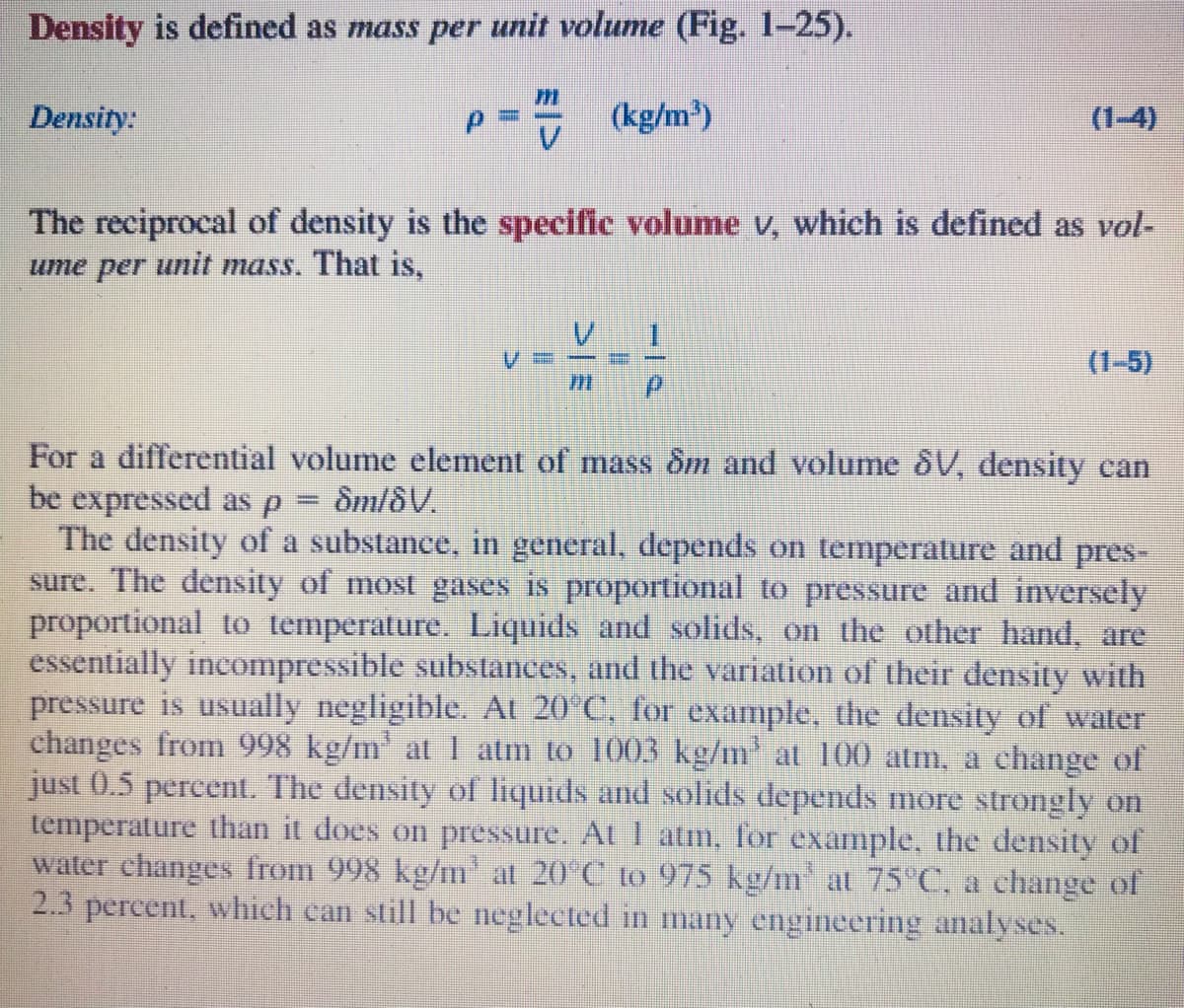Density is defined as mass per unit volume (Fig. 1-25). Density: (kg/m) (1-4) The reciprocal of density is the specific volume v, which is defined as vol- ume per unit mass. That is, 1. (1-5) For a differential volume element of mass ôm and volume &V, density can be expressed as P The density of a substance, in general, depends on temperature and pres- sure. The density of most gases is proportional to pressure and inversely proportional to temperature. Liquids and solids, on the other hand, are essentially incompressible substances, and the variation of their density with pressure is usually negligible. At 20°C, for example, the density of water changes from 998 kg/m' at 1 atm to 1003 kg/m' at 100 atm, a change of just 0.5 percent. The density of liquids and solids depends more strongly on temperature than it does on pressure. At I atm, for example, the density of water changes from 998 kg/m' at 20°C to 975 kg/m' at 75°C, a change of 2.3 percent, which can still be neglected in many engineering analyses. Sm/dV.
Density is defined as mass per unit volume (Fig. 1-25). Density: (kg/m) (1-4) The reciprocal of density is the specific volume v, which is defined as vol- ume per unit mass. That is, 1. (1-5) For a differential volume element of mass ôm and volume &V, density can be expressed as P The density of a substance, in general, depends on temperature and pres- sure. The density of most gases is proportional to pressure and inversely proportional to temperature. Liquids and solids, on the other hand, are essentially incompressible substances, and the variation of their density with pressure is usually negligible. At 20°C, for example, the density of water changes from 998 kg/m' at 1 atm to 1003 kg/m' at 100 atm, a change of just 0.5 percent. The density of liquids and solids depends more strongly on temperature than it does on pressure. At I atm, for example, the density of water changes from 998 kg/m' at 20°C to 975 kg/m' at 75°C, a change of 2.3 percent, which can still be neglected in many engineering analyses. Sm/dV.
Elements Of Electromagnetics
7th Edition
ISBN:9780190698614
Author:Sadiku, Matthew N. O.
Publisher:Sadiku, Matthew N. O.
ChapterMA: Math Assessment
Section: Chapter Questions
Problem 1.1MA
Related questions
Question
100%

Transcribed Image Text:Density is defined as mass per unit volume (Fig. 1-25).
Density:
(kg/m)
(1-4)
The reciprocal of density is the specific volume v, which is defined as vol-
ume per unit mass. That is,
(1-5)
For a differential volume element of mass ôm and volume &V, density can
be expressed as P
The density of a substance, in general, depends on temperature and pres-
sure. The density of most gases is proportional to pressure and inversely
proportional to temperature. Liquids and solids, on the other hand, are
essentially incompressible substances, and the variation of their density with
pressure is usually negligible. At 20°C, for example, the density of water
changes from 998 kg/m' at I atm to 1003 kg/m' at 100 atm, a change of
just 0.5 percent. The density of liquids and solids depends more strongly on
temperature than it does on pressure. At I atm, for example, the density of
water changes from 998 kg/m at 20°C to 975 kg/m at 75 C, a change of
2.3 percent, which can still be neglected in many engineering analyses.
Sm/8V.
Expert Solution
This question has been solved!
Explore an expertly crafted, step-by-step solution for a thorough understanding of key concepts.
This is a popular solution!
Trending now
This is a popular solution!
Step by step
Solved in 2 steps

Recommended textbooks for you

Elements Of Electromagnetics
Mechanical Engineering
ISBN:
9780190698614
Author:
Sadiku, Matthew N. O.
Publisher:
Oxford University Press

Mechanics of Materials (10th Edition)
Mechanical Engineering
ISBN:
9780134319650
Author:
Russell C. Hibbeler
Publisher:
PEARSON

Thermodynamics: An Engineering Approach
Mechanical Engineering
ISBN:
9781259822674
Author:
Yunus A. Cengel Dr., Michael A. Boles
Publisher:
McGraw-Hill Education

Elements Of Electromagnetics
Mechanical Engineering
ISBN:
9780190698614
Author:
Sadiku, Matthew N. O.
Publisher:
Oxford University Press

Mechanics of Materials (10th Edition)
Mechanical Engineering
ISBN:
9780134319650
Author:
Russell C. Hibbeler
Publisher:
PEARSON

Thermodynamics: An Engineering Approach
Mechanical Engineering
ISBN:
9781259822674
Author:
Yunus A. Cengel Dr., Michael A. Boles
Publisher:
McGraw-Hill Education

Control Systems Engineering
Mechanical Engineering
ISBN:
9781118170519
Author:
Norman S. Nise
Publisher:
WILEY

Mechanics of Materials (MindTap Course List)
Mechanical Engineering
ISBN:
9781337093347
Author:
Barry J. Goodno, James M. Gere
Publisher:
Cengage Learning

Engineering Mechanics: Statics
Mechanical Engineering
ISBN:
9781118807330
Author:
James L. Meriam, L. G. Kraige, J. N. Bolton
Publisher:
WILEY